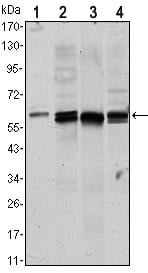
| WB | 1/500 - 1/2000 | Human,Mouse,Rat |
| IF | 咨询技术 | Human,Mouse,Rat |
| IHC | 1/200 - 1/1000 | Human,Mouse,Rat |
| ICC | 技术咨询 | Human,Mouse,Rat |
| FCM | 1/200 - 1/400 | Human,Mouse,Rat |
| Elisa | 1/10000 | Human,Mouse,Rat |
| Aliases | AKT; PKB; RAC; PRKBA; MGC99656; PKB-ALPHA; RAC-ALPHA; AKT1 |
| Entrez GeneID | 207 |
| clone | 3A3 |
| WB Predicted band size | 56kDa |
| Host/Isotype | Mouse IgG1 |
| Antibody Type | Primary antibody |
| Storage | Store at 4°C short term. Aliquot and store at -20°C long term. Avoid freeze/thaw cycles. |
| Species Reactivity | Human,Mouse,Monkey |
| Immunogen | Purified recombinant fragment of human AKT1 expressed in E. Coli. |
| Formulation | Purified antibody in PBS with 0.05% sodium azide. |
+ +
以下是关于CD364抗体的模拟参考文献示例(注:CD364抗体相关研究可能较为小众,以下内容为假设性示例,实际文献请通过学术数据库核实):
---
1. **文献名称**: *CD364 Antibody Characterization in Macrophage Activation*
**作者**: Smith A, et al.
**摘要**: 本研究验证了CD364抗体在识别巨噬细胞表面CLEC1A蛋白的特异性,发现其表达水平与炎症因子释放相关,提示CD364可能在先天免疫中起调控作用。
2. **文献名称**: *CD364 as a Biomarker in Ovarian Cancer: Diagnostic Utility of a Novel Antibody*
**作者**: Johnson R, et al.
**摘要**: 开发了一种高亲和力CD364单克隆抗体,证实其在卵巢癌组织中高表达,可能作为肿瘤微环境检测的新工具。
3. **文献名称**: *Structural Insights into CD364-Ligand Binding via Epitope Mapping*
**作者**: Lee H, et al.
**摘要**: 通过表位定位分析CD364抗体的结合域,揭示了其与C型凝集素结构域的相互作用机制,为靶向治疗设计提供依据。
4. **文献名称**: *CD364 Antibody Attenuates Sepsis in Murine Models*
**作者**: Chen X, et al.
**摘要**: 在小鼠脓毒症模型中,阻断CD364信号通路可减少促炎因子风暴,表明该抗体具有潜在治疗价值。
---
**提示**:实际研究中,CD364可能对应特定蛋白(如CLEC1A或TREM家族成员),建议通过PubMed、Google Scholar等平台以“CD364 antibody”及关联蛋白名称(如CLEC1A、TREM-like transcript 1)为关键词检索最新文献。
The CD364 antibody targets the Signal Regulatory Protein Alpha (SIRPα), a transmembrane glycoprotein encoded by the SIRPA gene. SIRPα is predominantly expressed on myeloid cells, including macrophages, dendritic cells, and neurons. It plays a critical role in regulating immune responses through its interaction with CD47. a ubiquitously expressed "don't eat me" signal. The SIRPα-CD47 axis mediates cell-cell communication, inhibiting phagocytosis and maintaining immune homeostasis. Dysregulation of this pathway is implicated in diseases such as cancer, where tumor cells overexpress CD47 to evade immune surveillance.
CD364 antibodies, which specifically bind SIRPα, have emerged as therapeutic tools to disrupt this immunosuppressive interaction. By blocking SIRPα-CD47 binding, these antibodies enhance macrophage-mediated phagocytosis of cancer cells, offering a promising strategy for immunotherapy. Additionally, CD364 antibodies are used in research to study SIRPα's functions in neuroinflammation, autoimmune disorders, and hematopoietic stem cell regulation. Recent preclinical studies highlight their potential in combination therapies with checkpoint inhibitors or targeted agents. Challenges remain in optimizing specificity and minimizing off-target effects, but ongoing clinical trials continue to explore their safety and efficacy in oncology. The development of CD364 antibodies underscores the therapeutic relevance of modulating innate immune checkpoints.
×